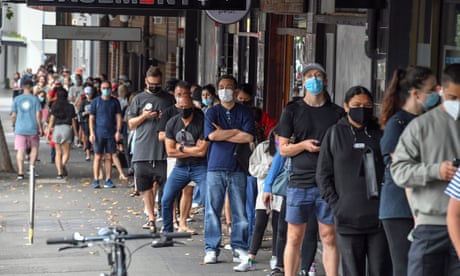- by foxnews
- 08 Apr 2025
?We?re all going to get Omicron?: NSW health minister?s warning as state records 6,394 cases
‘We’re all going to get Omicron’: NSW health minister’s warning as state records 6,394 cases
- by theguardian
- 26 Dec 2021
- in news

New South Wales has reported 6,394 new infections on Boxing Day and 458 cases in hospital, with the health minister warning "we're all going to get Omicron".
The case numbers are a slight increase on the already record case numbers reported on Christmas Day.
"The challenge for us in the state is to make sure that our health system can cope with that oncoming virus that is so transmissible."
There are 2,000 health staff currently furloughed across the state, prompting Hazzard to warn residents to "think carefully" before calling an ambulance or heading to hospital due to the "enormous pressure" currently on the system.
Queensland has recorded 714 new cases, another daily record for the state, with seven people in hospital and none in intensive care.
Victoria reported a slight decrease in daily case numbers, with 1,608 new Covid-19 infections, including 374 in hospital.
It comes as thousands of Australians experienced a lonely festive season in isolation due to either contracting Covid-19 or coming into contact with a case.
The country is battling its biggest, most widespread outbreak, with the Omicron variant in every state and territory.
Tasmania has reported 44 new Covid cases, a slight jump on Saturday's numbers bringing active cases on the island to 157. There is one person being treated in hospital and none requiring intensive care.
On Saturday, NSW reported a record 6,288 cases. Queensland similarly had a record 765 new infections, 151 of them of the Omicron variant, and in Victoria 2,108 people tested positive for the virus.
Also on Saturday, South Australia recorded 634 new cases, Tasmania had 33 cases, while the Northern Territory reported 19 cases, 10 of which were interstate arrivals.
Western Australia recorded two new local Covid-19 infections on Saturday, both linked to a French backpacker who arrived in the state from Queensland.
Mask wearing is compulsory in most states and territories, as leaders try to limit the spread of the highly infectious variant over the festive season.
Meanwhile, wait times for testing and results have blown out in several states.
The NSW premier, Dominic Perrottet, urged residents to rethink getting a PCR test if they were symptomless and hadn't been contacted by NSW Health due to ongoing pressure on the system.
He said wait times had blown out to between 48 and 72 hours to receive a test result but was longer than three days "in some instances".
"Only go and get a PCR test if you are required by NSW Health or you feel unwell or because of those interstate requirements by the other governments around the country," he said.
As infections continue to rise, the federal government announced the wait for booster shots will be reduced twice in January.
From 4 January, boosters will be brought forward to four months after the second dose - down from five months currently.
Then from 31 January, people can get boosters after three months.
Sign up to receive an email with the top stories from Guardian Australia every morning
About 7.5 million Australians will be eligible for their booster shot come 4 January. This will jump to 16 million at the end of the month.
The federal health minister, Greg Hunt, praised Australians who have rolled up their sleeves for their third dose.
"Many thanks to Australians for taking us well past two million boosters," he tweeted.
Some 123,500 shots were given on Christmas Eve, 94,072 of them boosters.
The prime minister, Scott Morrison, and the opposition leader, Anthony Albanese, used their Christmas messages to thank Australians for standing together and supporting each other during the pandemic.
"This pandemic continues to buffet us ... [but] Christmas is a time of hope and we are an optimistic people," Morrison said.
Albanese said Australians deserved to have a happy Christmas after a challenging two years.
"With our borders opening up again, we're getting back together. Off the Zoom and actually back in the room with family, friends and loved ones," he said.
- by foxnews
- descember 09, 2016
Ancient settlement reveals remains of 1,800-year-old dog, baffling experts: 'Preserved quite well'
Archaeologists have recently unearthed the remarkably well-preserved remains of a dog from ancient Rome, shedding light on the widespread practice of ritual sacrifice in antiquity.
read more


